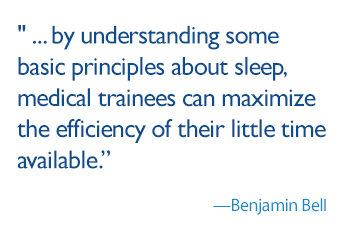At the proverbial watercooler in teaching hospitals across the world, one hears remarkably similar refrains: “This patient is back again,” “I have no idea why my experiment failed this time” and, most universally, “I’ve only slept three hours in the past two days!” Medical trainees often view sleep deprivation as a badge of honor, one that demonstrates in a quantifiable manner just how hard we are working. But time and again, adequate sleep has been shown to be vital for human health and performance, and researchers are continuing to learn how to best optimize sleep time and uncovering the associated benefits.
Nearly a third of all Americans suffer from some form of sleep disturbance with widely varying etiologies, both endogenous (e.g., familial insomnia and stress) and exogenous (e.g., employment interference). This number jumps to 50 percent among populations of medical and graduate students, and with it, the concomitant health concerns: increased mental stress, increased susceptibility to illness and decreased focus and attention. Unsurprisingly, survey respondents all pointed to similar explanations for their poor sleep — the stress of high-level academics and the vast time commitment required by training in the field. Although these challenges are often par for the course, by understanding some basic principles about sleep, medical trainees can maximize the efficiency of their little time available.
To gain a better understanding of how to tackle the challenges of sleep deprivation in medical/graduate school, there is no better authority to speak with than Mark Wu. Having completed both medical and graduate school himself, Wu currently serves as a sleep neurologist at The Johns Hopkins Hospital and as the lead investigator of a basic neuroscience lab that studies the molecular mechanisms underlying sleep regulation. I sat down with Wu to discuss the ways in which trainees can get the most out of their limited time during the most sleep-stressed points in their careers.
Wu first clarified an important distinction: Sleep deprivation — that slow-moving, drained feeling one has after many hours without rest — can result from a reduction in either the amount of sleep or the quality of sleep. The former is more commonly reported, likely because intense work and academic requirements leave students with little time to sleep. However, the latter can be equally impactful and often more difficult to discern. A loss in sleep quality can arise for various reasons, including disconnection between sleep time and the circadian rhythm (e.g., sleeping during the day during night shift work), stress, caffeine intake and alcohol.
 To avoid the health and performance deficits that result from sleep deprivation, Wu made two major recommendations. First, guard your sleep time. We all have busy schedules, and as our responsibilities and social lives become cluttered, too often we carve out time that should be spent resting. He advises picking and maintaining consistent times to go to bed and wake up. Doing so optimizes the time available to sleep and increases your ability to have both the right amount and quality of sleep.
To avoid the health and performance deficits that result from sleep deprivation, Wu made two major recommendations. First, guard your sleep time. We all have busy schedules, and as our responsibilities and social lives become cluttered, too often we carve out time that should be spent resting. He advises picking and maintaining consistent times to go to bed and wake up. Doing so optimizes the time available to sleep and increases your ability to have both the right amount and quality of sleep.
Second, pay attention to sleep hygiene. No, this doesn’t mean showering before bed. In fact, sleep hygiene refers to a number of behavioral interventions that may contribute to more effective sleep. For trainees, these should include a consistent sleep period (preferably during the night), regular exercise, and avoiding both naps and caffeine in the afternoon, as both may lead to sleep fragmentation and a reduction in the restorative quality; alcohol will do the same.
Although academics and work requirements will inevitably tax our ability to enjoy a good night’s rest, by optimizing both the time spent sleeping and sleep quality, we can counteract some of these restrictions and better avoid those groggy, ill feelings that are associated so strongly with sleep deprivation. Plus, as Wu is quick to point out from experience, as stressed out about sleep as we may be now, it’s a walk in the park compared to raising that first new child.
Related Content
- Need to wind down? Try yoga for better sleep.
- The Science of Sleep: Understanding What Happens When You Sleep
- Several types of sleep problems require clinical care by a physician or other health care professional. Do you know which ones?
- Visit our Healthy Sleep portal to learn more about how sleep impacts your health, and how to have a more restful night.
